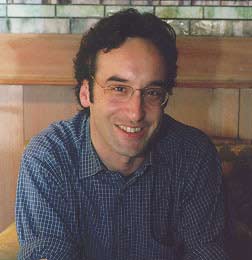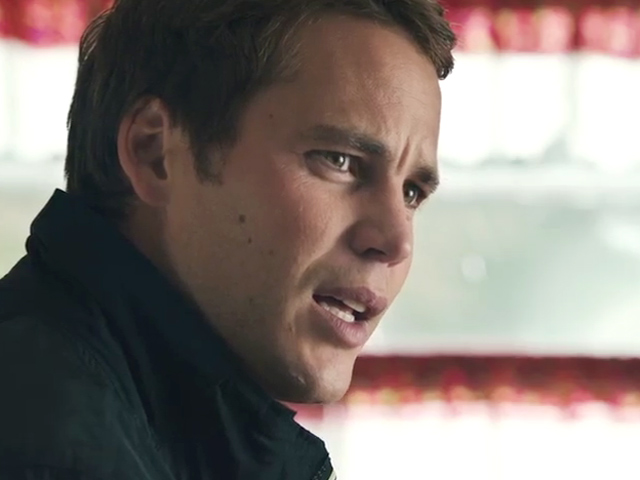
Don McKellar Interview
07 January 2009Writer-director-actor McKellar meditates on Armageddon for intelligent, emotional 'Last Night'
(Some questions in this interview may have come from other journalists present for the Q&A.)
Don McKellar: Well, that's particularly why I didn't deal with how it was happening, because I'm a bit that way, too, and I didn't want the audience thinking, "Is that possible?" and "Can they do anything about that?" and "Wouldn't that effect the temperature?"
And where's Bruce Willis! (A tired smirk crawls across his face.) Presumably he's out there doing his job. But I didn't want people to be focusing on that. I didn't want them to be thinking, "How could we get out of this?" I wanted them to be in the same place where the characters are, (and) I would hope at this point -- in the last six hours -- people would come to terms with it. At least the people I was focusing on. I really wanted it to be a personal story. An inter-personal story. I was interested in the people that are usually wiped out off-screen in most Hollywood pictures with such a story.
Well, you're right. It's funny, when I first talk about this (project) with friends -- when I asked them what they would do on that day -- the first thing the majority of them said was "sex!" Men and women. And my friends are not particularly perverse. I think it really is a natural response.
People maybe know her best from "Arli$$," where she's a very broad, comic actor. But I've seen her do a lot of really powerful, amazing stuff that probably didn't come down here (to the United States from McKellar's and Oh's native Canada). And this part is a hard part because she had to carry the emotional weight of the film -- of the whole world -- on camera for the longest time. I thought she could do that without being real sentimental or cloying because she has this kind of dignity and strength I find compelling, and that I think I needed. I read some other women, but they tended to romanticize, which really cheapened things immediately.
Actually, this script was commissioned to me by this French production company, (which was) commissioning 10 films in 10 countries about the turning of the millennium. They were all supposed to be set on December 31, 1999 -- I actually didn't get the rules quite right there. I thought it was supposed to be about your feelings about the end of the millennium. I just decided to take it all the way and put the damn thing to sleep.
Well, the idea came almost immediately after they proposed it to me. The idea just popped right out, which is great, because I'm usually a very slow writer. I'd been thinking about doing a feature for a long time, and it was an amazing kick in the ass to have someone say, "We'll give you a lot of money to do a film about this topic." And, also, giving me a topic really helped me focus. I immediately had ideas, I had an approach. Right away I knew the sort of tack I was going to take about the end of the world.
It was really, really hard. I thought it was a practical way of giving a strong look to a lower-budget film, but it proved to be a nightmare. We had to pay off stores. We had to close down busy downtown streets. And it always had to be daylight. People kept walking through and interrupting. You can have a person go through, but as soon as someone looks like they're on their way to work or pulling up in a delivery van, the whole end-of-the-world theme sort of falls apart. If you heard the real sound for (those scenes), it's just non-stop car horns, people screaming. That scene where we had the smoke on the street, I had a firetruck come five times on day, interrupting the shooting because of concerned citizens.
We had a lot of controversy over that, and we had to go down to L.A. because they didn't like it for the brightness and for colors. It's a kind of a process that I don't think audiences know exactly what's going on, and that's why I like it. I really wanted something that sold the idea that something was weird about the world. That something was off. Even more than atmosphere, because there's something wrong with the light. It helped sell the subtext that the world was ending.
Initially there would be some sort of social collapse, and then most people would get beyond that and try to deal with their own lives after they (looted) their brand new TV. I thought about making it more central at on point, and focusing on some of those characters. But it seemed to me less interesting, ultimately. It seemed to me a more unusual type of character, the people who had come to terms with it. I'd like to think there's some ordinary heroism (in them) that people can identify with.
I don't care if it's a big box office hit. You realized after you do this for a while that certain things make an impact and certain things don't. Someone can come up and gush all over you and it doesn't really satisfy anything. You realize at some point that some things are more important than others. Hopefully it's the work that gives you the satisfaction...combined with certain smart, attractive people enjoying the film! (On his third cup of coffee, he cracks a true smile for the first time.)
(Laughing.) Isn't that why you go into this business?
Immediately upon meeting Don McKellar, one realizes he's the kind of guy who can turn a quick cup of joe at Starbucks into a probing intellectual debate on just about any topic you chose. He just has that studied, bespectacled, plaid-shirts-and-coffee-cup-at-the-ready look. He'd probably have been a beatnik in the '60s.
So it's no surprise, really, that he could crank out a psychologically weighty doomsday movie as his directorial debut. "What would you do if the world were to end tomorrow," seems like the kind of question he might ask just to experiment with the psyche of someone he met at a party.
It's also the question that his film "Last Night," leaves lingering in the minds of the audience hours after the credits roll. A soul-searching allegory about how a dozen interwoven characters spend their last hours on Earth, before it is consumed in a way the movie is deliberately vague about. Instead of focusing on the destruction of the planet, McKellar patiently peels away his characters' thick layers of frayed emotions as he builds an intense but strangely calm atmosphere of Armageddon.
Vignettes include a family treating their doom like a holiday, a partying pair of newlyweds, a young rocker rushing to fulfill a sexual fantasy and two deeply moving performances from Sandra Oh, as a devoted wife trying to get home to her husband, and McKellar himself as a lonely man full of spite and determined to spend his closing hours alone.
Operating on only a few hours of sleep, the Canadian actor ("eXistenZ") and writer ("The Red Violin") has just flown into San Francisco overnight from an East Coast film festival, so he's made sure his publicist understands he needs a steady supply of caffeine as we sit down in the lobby of the Prescott Hotel to talk about his movie, in which -- yes -- the world comes to an end.
| Contactmusic.com: Part of me always has a hard time getting over suspension of disbelief, so at first I was trying to logically dissect the end of the world instead of letting the film wash over me. Was overcoming that kind of left-brain-ism a hurdle in the writing process? |
| ...And where's Bruce Willis to save us all! |
| Of course, in such a story the themes of sex and death are unavoidably thrust to the forefront, even with the deepest characters. |
| And yet your characters have so much more going on. So much weight on their shoulders. And most of it seems to come down on Sandrah Oh, who is phenomenal. |
| What was the origin of the story? |
| So what are the freedoms and limitations of being commissioned to make a film? |
| Making Toronto look deserted must have been a challenge. |
| You used a photographic process called bleach bypass (which leaves silver on the negative) to give the film an extreme, grainy contrast... |
| How much time did you spend thinking about the inclusion or exclusion of the kind of anarchy and chaos that probably would have come under these circumstances? |
| "Last Night" has already played throughout the rest of the world. Do you have high hopes for its run here in the U.S.? |
| So you're using the movie to pick up chicks, is this what you're telling me? |
Contactmusic
Top 10 Videos
Wallace Chung
XXX
1
10 Years
Beautiful
2
Fast Girls
Fast Girls
3
Shaggy
Hey Sexy Lady
4
Air
Sexy Boy
5
The Staves
Tired As F***
6
Robin Thicke
Blurred Lines (Unrated Version)
7
All That Remains
Six (Live)
8
Fugees
Boof Baf
9
Fleur East
Sax [Live]
10
Related
Movies and Trailers

The Grand Seduction Trailer
Murray French is a resident in a seaside village that is struggling desperately in the...
